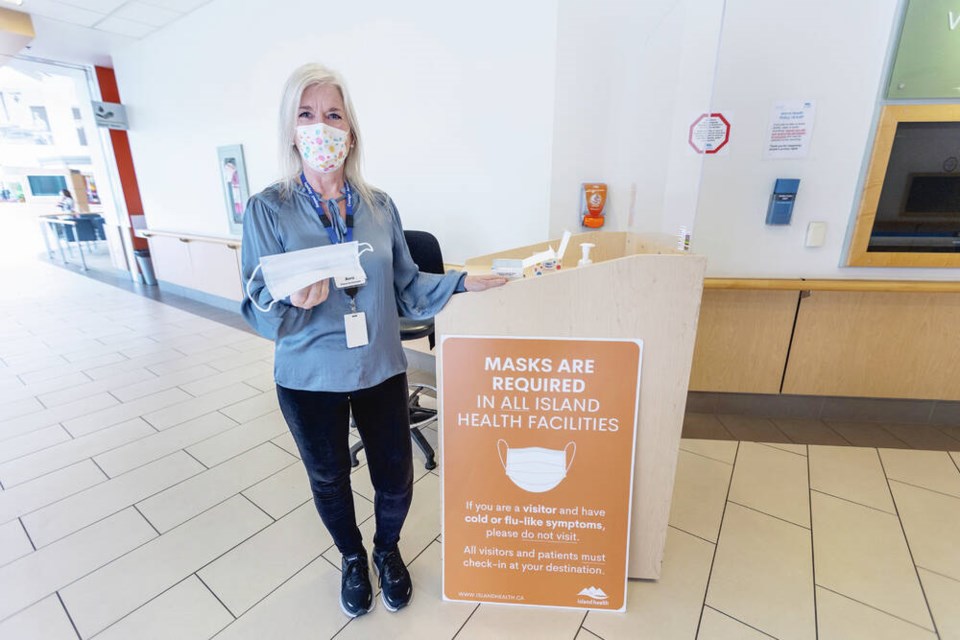Mask mandates returned to all Island Health patient-care facilities, including hospitals, on Tuesday, as a COVID outbreak was declared on an acute care wing of Victoria General Hospital.
Mask ambassadors began their shifts at the front doors of hospitals to screen staff and visitors for symptoms, offer surgical masks for those without them, and encourage hand hygiene via sanitizing stations.
The return of masks coincided with Island Health declaring an outbreak at Victoria General attributed to 11 hospital or health-care acquired cases on one acute-care ward, unit 6C.
Provincial health officer Dr. Bonnie Henry and Health Minister Adrian Dix announced the return of mandatory masking in health-care facilities last week.
Vaccines are expected to roll out to priority groups next week through invitations to book appointments on the government’s Get Vaccinated website.
Island Health medical health officer Dr. Dee Hoyano said health-care staff will be expected to wear masks and visitors will be offered one. The ambassadors are advising anyone who feels ill or has signs of respiratory illness to return home and come back when they are feeling well.
Clinicians in private practice, including dentists, chiropractors, physiotherapists and doctors, will be given recommendations and guidance around masking.
Residents in long-term care homes and patients in hospital rooms will not be expected to wear a mask, said Hoyano, saying the mandate is geared to staff and visitors.
“I still firmly believe that vaccination is the number-one tool we have, so that people who are at higher risk should definitely get vaccinated,” said Hoyano.
Adriane Gear, president of the B.C. Nurses’ Union, said nurses generally support masking, which, combined with other recommended interventions — especially vaccination — is important in the face of COVID, influenza and RSV.
“No one likes wearing a mask for 12 or 16 hours, but in this context, it makes sense as part of a suite of infection prevention and control measures.”
But Gear said nurses working under increasingly stressful conditions amid a staffing shortage should not be expected to deal with visitors who refuse to wear a mask. “Our expectation is that the employer will police and enforce this policy,” she said. “That is not up to nurses or other health-care workers. This is a government policy.”
Gear noted that verbal abuse and physical violence against nurses has been on the rise across Canada, adding: “If the public is disgruntled that’s unfortunate but, bottom line, don’t take it out on nurses.”
As for the updated COVID-19 vaccine, Hoyano said she expects to see those in long-term care starting to get their shots “very, very shortly,” with community availability expected to begin next week.
Once invitations begin to roll out next week, British Columbians are advised to get their COVID and flu shots at the same appointment, with most pharmacies offering both.
After the vaccines are provided to those in long-term care and assisted living homes, invitations to book COVID and flu shots will be sent first to priority groups, including those 65 and older, people with chronic health conditions such as cancer, HIV, hepatitis C and diabetes, Indigenous peoples, people who are pregnant, and health-care workers.
Vaccination will continue to be mandatory for all new health-care workers, including nurses. Health-care workers who were not previously vaccinated will be considered fully vaccinated if they receive the newly updated COVID-19 shot.
Public health officials recommend getting the COVID-19 vaccine at least six months from a previous COVID-19 vaccine dose or known infection.
Vaccines will be available through more than 1,200 pharmacies as well as community clinics and primary-care clinics.
Both Pfizer-BioNTech and Moderna have received Health Canada approval for their updated monovalent mRNA vaccine, which has been adapted to the Omicron subvariant XBB.1.5.
The new formulation is expected to be effective against circulating Omicron strains EG.5 and XBB.1.16 as well as BA.2.86. Henry said Thursday there has been just one reported case in B.C. of the latter strain.
In terms of influenza vaccines, there are a variety of injectables, said Henry. There is a nasal-spray vaccine for those age two to 17, as well as two enhanced vaccines for those over 65.
>>> To comment on this article, write a letter to the editor: [email protected]



